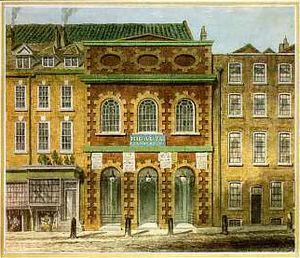Scipione facts for kids
Scipione (also known as Publio Cornelio Scipione) is an opera seria (a serious opera) written by George Frideric Handel. He composed the music in 1726 for the Royal Academy of Music. The story was written by Paolo Antonio Rolli. Handel created Scipione while also working on another opera called Alessandro.
The opera is based on the life of a famous Roman general named Scipio Africanus. A slow march from this opera is very well-known. It is the official march of the Grenadier Guards, a famous British army regiment. It is also played at police graduation ceremonies in London.
Contents
First Performances
Scipione first opened on March 12, 1726, at The King's Theatre in Haymarket, London. Handel brought the opera back in 1730. After that, it wasn't performed in the UK again until October 1967. The Handel Opera Society put on that show.
In Germany, Scipione was performed at the Göttingen International Handel Festival in 1937. It was also part of the annual Handel Festival in Halle in 1965. Today, people are very interested in old Baroque music. Because of this, Scipione and other Handel operas are often performed at festivals and opera houses around the world.
Main Characters
| Role | First Actor (1726) |
|---|---|
| Scipione, leader of the Roman army | Antonio Baldi |
| Lucejo, a Spanish prince in disguise | Francesco Bernardi, known as "Senesino" |
| Lelio, a Roman general | Luigi Antinori |
| Berenice, a captured princess | Francesca Cuzzoni |
| Armira, another captured woman | Livia Constantini |
| Ernando, King of the Balearic Islands and Berenice's father | Giuseppe Maria Boschi |
The Story of Scipione
The story takes place in New Carthage (now Cartagena) in 210 BCE. The Roman army, led by Scipione, has just captured the city from their enemies.
Act 1: New Captives
Scipione leads a parade of captured people into the city. He is proud of his victory and praises his officers, especially Lelio. Lelio offers Scipione a captured woman named Berenice. Scipione is immediately drawn to Berenice. However, he promises to treat her with respect.
Berenice is secretly in love with Lucejo, a Spanish prince. Lucejo is disguised as a soldier in the Roman army. He plans to rescue her. Lelio is interested in another prisoner, Armira. But she won't return his feelings while she is a captive. Lelio starts to feel sympathy for the prisoners. He tells Berenice to accept Scipione's kindness.
The captured women are kept in a palace garden. Scipione has forbidden anyone else to enter. Lucejo, still in disguise, sneaks into the garden. He hides when Scipione approaches. Scipione tries to win Berenice's love. Lucejo cannot stand this and shouts out, revealing himself. Berenice tries to protect Lucejo by saying he is mad. At the end of the act, Lucejo feels unsure about Berenice's actions and becomes jealous.
Act 2: Jealousy and Challenges
Ernando, Berenice's father, arrives. He offers to pay a ransom for his daughter and to become friends with Scipione. Scipione tries again to win Berenice's heart, but she still refuses him. After Scipione leaves, Lucejo appears. Berenice dismisses him, which makes Lucejo even more jealous.
Even though he is jealous, Lucejo doesn't completely give up on Berenice. He pretends to show interest in Armira, hoping Berenice will overhear. Both Berenice and Armira are upset. Scipione arrives, angry to see Lucejo in the garden. Lucejo then reveals who he really is and challenges Scipione to a fight. Scipione orders Lucejo's arrest. Berenice then admits she could love a Roman, but she has already promised herself to someone else.
Act 3: A Noble Decision
Scipione offers Ernando Berenice's freedom if he can marry her. Ernando replies that he would give up his life and kingdom, but he cannot break his promise to Lucejo that Berenice would marry him. Scipione is impressed by Ernando's honesty. He plans to send Lucejo to Rome as a prisoner.
Scipione thinks more about the situation. He decides to put aside his own wishes for the happiness of others. He tells Berenice about his change of heart. He accepts the ransom from Ernando and frees Berenice. He tells her she can marry Lucejo. He even gives the ransom money to the couple as a wedding gift. Everyone praises Scipione's generosity. Lucejo promises loyalty to Rome for himself and his people.
Recordings
- A full recording of the opera was conducted by Christophe Rousset. It features Les Talens Lyriques. It was released on 3 CDs in 1994 and reissued in 2010. The singers include: Scipione: Derek Lee Ragin; Berenice: Sandrine Piau; Lucejo: Doris Lamprecht; Ernando: Olivier Lallouette; Armira: Vanda Tabery; Lelio: Guy Fletcher.
Images for kids
-
Nicolas Poussin's painting of The Continence of Scipio. It shows Scipio returning a captured young woman to her fiancé. He refused to take her as a prize of war.
See also
 In Spanish: Scipione para niños
In Spanish: Scipione para niños




